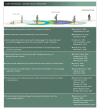Aging, Social Distancing, and COVID-19 Risk: Who is more Vulnerable and Why?
- PMID: 34631211
- PMCID: PMC8460299
- DOI: 10.14336/AD.2021.0319
Aging, Social Distancing, and COVID-19 Risk: Who is more Vulnerable and Why?
Abstract
Perceived social support represents an important predictor of healthy aging. The global COVID-19 pandemic has dramatically changed the face of social relationships and revealed elderly to be particularly vulnerable to the effects of social isolation. Social distancing may represent a double-edged sword for older adults, protecting them against COVID-19 infection while also sacrificing personal interaction and attention at a critical time. Here, we consider the moderating role of social relationships as a potential influence on stress resilience, allostatic load, and vulnerability to infection and adverse health outcomes in the elderly population. Understanding the mechanisms how social support enhances resilience to stress and promotes mental and physical health into old age will enable new preventive strategies. Targeted social interventions may provide effective relief from the impact of COVID-19-related isolation and loneliness. In this regard, a pandemic may also offer a window of opportunity for raising awareness and mobilizing resources for new strategies that help build resilience in our aging population and future generations.
Keywords: COVID-19; aging; allostasis; allostatic load; confinement; lockdown; novel coronavirus; nursing homes; physical distancing; senior care; social distancing; social isolation; two-hit model.
copyright: © 2021 Faraji et al.
Conflict of interest statement
Declaration of Conflict None of the authors declare any competing interests.
Figures



Similar articles
-
Well-Being and Loneliness in Swiss Older Adults During the COVID-19 Pandemic: The Role of Social Relationships.Gerontologist. 2021 Feb 23;61(2):240-250. doi: 10.1093/geront/gnaa194. Gerontologist. 2021. PMID: 33258898 Free PMC article.
-
Identifying Frail Populations for Disease Risk Prediction and Intervention Planning in the Covid-19 Era: A Focus on Social Isolation and Vulnerability.Front Psychiatry. 2021 Aug 20;12:626682. doi: 10.3389/fpsyt.2021.626682. eCollection 2021. Front Psychiatry. 2021. PMID: 34489745 Free PMC article.
-
The paradox of social distancing: Implications for older adults in the context of COVID-19.Psychol Trauma. 2020 Aug;12(S1):S214-S216. doi: 10.1037/tra0000845. Epub 2020 Jun 11. Psychol Trauma. 2020. PMID: 32525379
-
How the COVID-19 pandemic is focusing attention on loneliness and social isolation.Public Health Res Pract. 2020 Jun 30;30(2):3022008. doi: 10.17061/phrp3022008. Public Health Res Pract. 2020. PMID: 32601651 Review.
-
Impact of covid-19 on mental health and aging.Saudi J Biol Sci. 2021 Dec;28(12):7046-7053. doi: 10.1016/j.sjbs.2021.07.087. Epub 2021 Aug 4. Saudi J Biol Sci. 2021. PMID: 34377058 Free PMC article. Review.
Cited by
-
Harnessing BDNF Signaling to Promote Resilience in Aging.Aging Dis. 2024 Sep 3;16(4):1813-1841. doi: 10.14336/AD.2024.0961. Aging Dis. 2024. PMID: 39656488 Free PMC article. Review.
-
Social Isolation Stress Modulates Pregnancy Outcomes and the Inflammatory Profile of Rat Uterus.Int J Mol Sci. 2022 May 31;23(11):6169. doi: 10.3390/ijms23116169. Int J Mol Sci. 2022. PMID: 35682846 Free PMC article.
-
Sleep Alterations in the Population of the Metropolitan Area of Mexico and Their Association with Lifestyle Changes During COVID-19 Confinement.Clocks Sleep. 2025 Feb 17;7(1):6. doi: 10.3390/clockssleep7010006. Clocks Sleep. 2025. PMID: 39982313 Free PMC article.
-
Association of self-rated health with type and frequency of social interaction during the declaration of COVID-19 state of emergency among Japanese community-dwelling oldest-old adults.Geriatr Gerontol Int. 2022 May;22(5):405-411. doi: 10.1111/ggi.14379. Epub 2022 Mar 22. Geriatr Gerontol Int. 2022. PMID: 35315191 Free PMC article.
-
The neuroexistentialism of social connectedness and loneliness.Front Behav Neurosci. 2025 Jul 10;19:1544997. doi: 10.3389/fnbeh.2025.1544997. eCollection 2025. Front Behav Neurosci. 2025. PMID: 40708846 Free PMC article.
References
-
- Onder G, Rezza G, Brusaferro S (2020). Case-Fatality Rate and Characteristics of Patients Dying in Relation to COVID-19 in Italy. Jama. - PubMed
-
- Hsiang S, Allen D, Annan-Phan S, Bell K, Bolliger I, Chong T, et al.. (2020). The effect of large-scale anti-contagion policies on the COVID-19 pandemic. Nature. - PubMed
-
- Flaxman S, Mishra S, Gandy A, Unwin HJT, Mellan TA, Coupland H, et al.. (2020). Estimating the effects of non-pharmaceutical interventions on COVID-19 in Europe. Nature. - PubMed
Publication types
LinkOut - more resources
Full Text Sources
